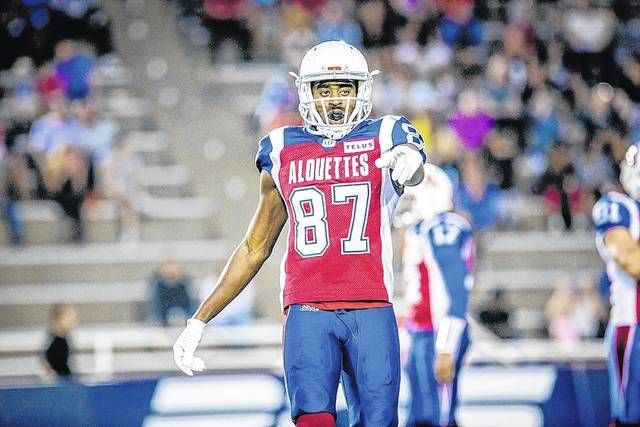
Former Wyoming Valley West and Penn State standout Eugene Lewis has made a name for himself as a pro with the Montreal Alouettes in the CFL.
Dominick Gravel | Montreal Alouettes
Click here to subscribe today or Login.
The Canadian Football League canceled its 2020 season Monday because of the pandemic, marking the first year since 1919 the Grey Cup won’t be awarded.
The move by the nine-team league dashed hopes of a shortened season in the hub city of Winnipeg, Manitoba.
Commissioner Randy Ambrosie said the decision was in the “best long-term interests” of the league.
“We are absolutely committed to 2021, to the future of our league and the pursuit of our vision of a bigger, stronger, more global CFL,” he said in a statement.
The news came as a blow to players like wide receiver Eugene Lewis, who starred at Wyoming Valley West before playing at Penn State and Oklahoma. Lewis had developed into one of the CFL’s top receivers with the Montreal Alouettes, topping 1,000 yards in 2019.
“Sick,” Lewis wrote in response to the league’s official announcement on Twitter. “Salty as hell.”
A few minutes later he added, “I’m always prepared for the (worst) and hoped for the best. That way I can’t be disappointed.”
The CFL, unlike other major leagues in North America, does not have the luxury of a billion-dollar television contract. While its deal with TSN has become more lucrative over the years, the CFL remains a gate-driven league, a major problem when fans aren’t allowed in the stands.
The league was unable to secure financing from the federal government after requesting an interest-free loan of $23.7 million on Aug. 3 to stage an abbreviated 2020 campaign.
The CFL said the federal government suggested the league pursue a commercial loan, which would be partially backed by Ottawa.
Minister of Canadian Heritage Steven Guilbeault said the government tried to work with the CFL, helping the league navigate emergency response programs available to businesses across Canada.
“Although the league was able to benefit from some of these programs, its board members ultimately made the decision not to pursue the upcoming season,” he said.
The commissioner has said the league lost more than $15 million last season.
“Even with government funding and a new CBA, our owners and community-held teams would have had to endure significant financial losses to play in 2020,” Ambrosie said.
The league also needed approval from the Public Health Agency of Canada. Dr. Howard Njoo, Canada’s deputy chief public health officer, said last Friday he was encouraged by the CFL’s plan, but couldn’t provide a timeline for a decision the league quickly needed to proceed.
The CFL said last month it had chosen Winnipeg as a hub city for a regular season with six games, followed by an eight-team playoff. No fans were to attend
But it was contingent on the league securing financial assistance from the federal government, solidifying an extension of the collective bargaining agreement and approving health and safety protocols.
The league also struggled to mend fences with the CFL Players’ Association. Politicians from all major parties criticized the CFL for not having its players involved in its initial financial assistance request.
When the pandemic first hit in March, the CFL had time on its side, with training camps not set to open until May. But as the situation worsened, the CFL began postponing camps and eventually the start of the regular season in June.
Later, the CFL called off the championship Grey Cup game in November in Regina, Saskatchewan, saying the model would not work without fans.
The cancellation also puts the new-look Edmonton team on hold. The team announced it was dropping the name Eskimos this summer after facing pressure from sponsors.




